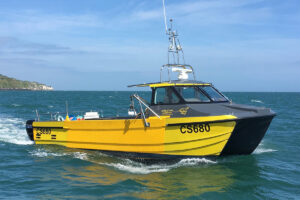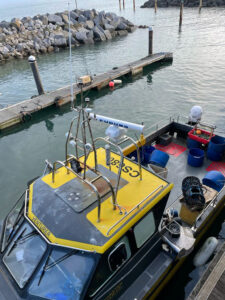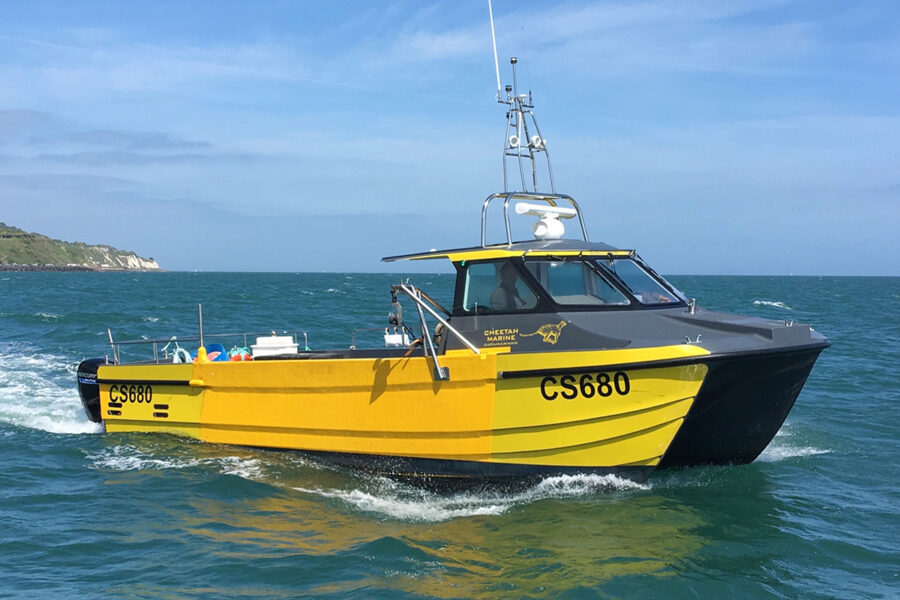Isle of Wight fisherman Geoff Blake, who was forced to pause the build process on his new 10m Cheetah Marine catamaran last month, is still waiting for the MCA’s decision on fuel tank regulations, reports Andy Read.
His letter to the transport minister outlined the delays caused by MCA objections to under-deck fuel tanks on the vessel – despite such tanks being approved for identical vessels, such as a recent patrol vessel delivered to the Scottish police.

Geoff Blake’s 2018-built Cheetah catamaran Venturer CS 680, which has under-deck fuel tanks: an identical build today would not meet with MCA approval for fishing industry use.
He also mentioned his concerns that above-deck tanks would make the new vessel less stable, and less safe, than identical hulls he had completed, and that are currently fishing, making the new-build vessel ‘less safe than one built five years ago’.
Geoff Blake has shared with FN the reply to his letter, which came not from the minister’s office but from the MCA. No reply has been received to date from the ministry.
In justifying the continued refusal to approve under-deck tanks, the MCA says that ‘several builders had difficulty complying with the required standard’ and that ‘owners may alter a safe installation to be unsafe’.
The MCA adds: “We are currently supporting Cheetah Marine through the process of making the first application since the new Fishing Vessel Code was introduced. Once the application is complete, we can assess it against the requirements, ensuring the safety of all onboard, and the environment, are protected.”
In the meantime, work on the new vessel has had to stop.

The red areas on Venturer’s deck indicate the location of the fuel tanks.
“Cheetah Marine developed their under-deck tanks over 20 years ago so fuel tanks larger than 27 litres could be safely installed, ‘fixed and protected against unacceptable movement, harm or operational damage and suitably vented’, as stated by the MCA in their reply,” Geoff Blake told FN.
“They exceed the requirements by also providing a low centre of gravity. They are insulated, keeping the fuel cool and free from moisture ingress, and have completed full fire tests. All fittings above deck are protected and vented. There is no air space around the tanks, eliminating the problem of having a tank void. Shut-off valves direct to the tank top inspection plate totally isolate the fuel tank in case of fire. These cannot be moved or changed by owners, and can be inspected through the tank top plate or pressure-tested for surveys. They have been proven over the last 20 years.
“The reasons given for the withdrawal of the approval of under-deck tanks in 2018 make no sense, especially from a safety perspective. To say it’s because other builders have difficulty in complying is not a justification to reduce safety standards.”
It is also ridiculous, he says, that the MCA charges fishermen on a case by case basis for established production designs already approved by the MCA for use as workboats, launches and in other fields. The delays in approval, as well as the actual fees involved, are creating a bias against commercial fishermen that, he argues, is entirely unjust.
He said: “I have referred this back to the ministry, raising my concerns about what is discrimination by the MCA against the fishing industry.
“In the meantime, the boat continues to be delayed, with no suggestion as to when we can finally go ahead and install the same fuel tanks, in the same hull design, as the fully approved – and safe – vessel we built in 2018 to the same design.”
Sean Strevens of Cheetah Marine said: “We are working closely with the MCA, and hopefully common sense will prevail on fuel tank installations.
“The answer from the MCA will also directly affect future stability of the under-10m fleet, as I am already seeing some other under-7m boat designs, both catamaran and monohull, raising their decks considerably to meet the new MCA code standards.
“They will pass static stability tests, but dynamic stability in a gale of wind and big seas will be dramatically reduced.”
This story was taken from the latest issue of Fishing News. For more up-to-date and in-depth reports on the UK and Irish commercial fishing sector, subscribe to Fishing News here or buy the latest single issue for just £3.30 here.








